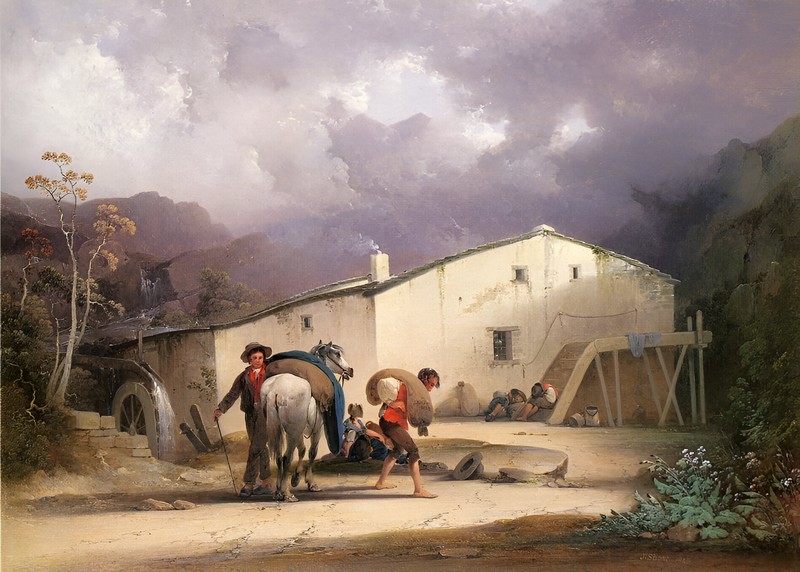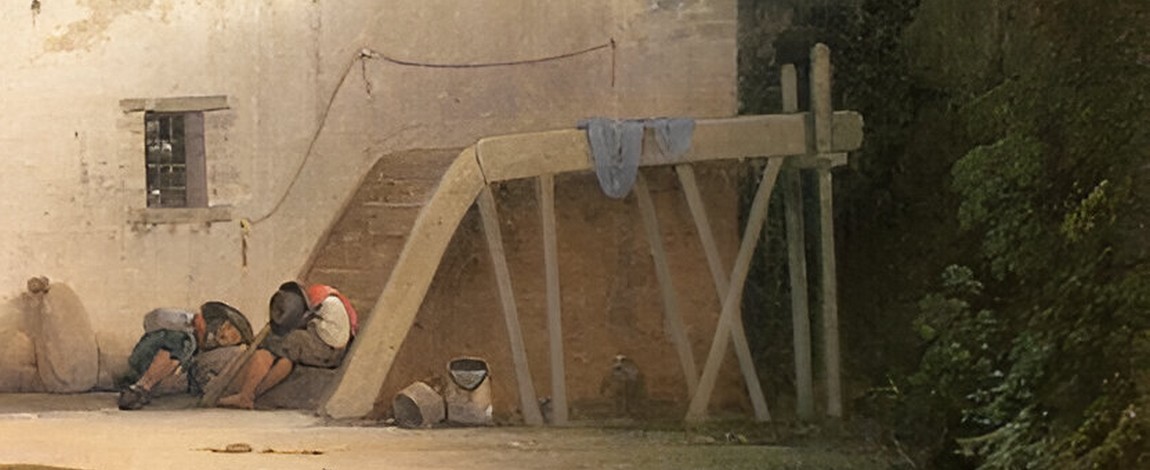
After leaving home (Das Wandern) and following the path shown to him by a brook (Wohin?), the young miller arrives at a mill where he will ask for work (Halt) and fall in love with the miller’s daughter (Danksagung an der Bach). This is how we find him in the fifth song of Die schöne Müllerin, Am Feierabend [On the restful evening].
In the first stanza we hear verbs in the conditional mood, which basically say that the young man wishes he were as strong as the strongest man in the mill so he could work harder and better. And no, it’s not that he aspires to be “employee of the month”: what he wants is to catch the attention of the fair miller’s daughter, who is called this way for the first time.
The second stanza has two parts. In the first, the conditionals give way to the harsh reality of the present: the young man is aware that his arms are weak –probably as weak as those of the other apprentices. In the second part we see the whole scene: the workday is over, and the workers are sitting in a circle with the miller and his daughter, who (how is it possible!) doesn’t even notice the young man’s presence. The miller praises their work, the miller’s daughter wishes them good night, and our protagonist ends the day disappointed.
Schubert’s music for the first stanza conveys the energy and tireless work the young man dreams of, imagining himself as a new Hercules; the repetition of the two last lines reinforces his desire for the miller’s daughter to single him out above the others. In the second stanza, the music calms down: on the one hand, because the young man is not as strong as he would like —and his sigh moves us—; on the other, because it reflects the peaceful atmosphere after a day’s work.
The interpretive key to the song lies, I would say, in the repetition of the last line of Wilhelm Müller’s poem: this “allen”: is there anger, disappointment, sadness, indignation…? Whatever the nuance, it’s clear that the young man is not satisfied with how the evening has gone (and we can imagine that every evening is the same: all the workers gathered and a few kind words to end the day).
Schubert underscores this dissatisfaction by returning to the first stanza, which now seems even more energetic than at the beginning. The most significant difference comes at the end: now the miller no longer says “merkte meinen treuen Sinn” but “merkte meinen, meinen treuen Sinn”; perhaps is he really angry with the girl, who hasn’t deigned to look at him? At HIM?
The song still has a coda: once again the last two lines are repeated, and now his frustration becomes more evident in the very slow phrases, and in all the piano notes that descend until ending in chords that sound as if the young man had punched a tree to let off steam.
Our performers for Am Feierabend will be Fritz Wunderlich and Gerold Huber, in the first of their three surviving recordings of the cycle, from 1964. With this, I thank the tenor for his music, today marking fifty-nine years since his death.
Just one more thing before we get to the music: lately I’ve been having some trouble with the comments on my posts, some of you may have noticed. Sorry if I haven’t replied to you; I’m working on fixing it. As always, thank you for sharing your thoughts here, even when the circumstances aren’t ideal.
And now, the music.
Hätt ich tausend
Arme zu rühren!
Könnt ich brausend
Die Räder führen!
Könnt ich wehen
Durch alle Haine!
Könnt ich drehen
Alle Steine!
Daß die schöne Müllerin
Merkte meinen treuen Sinn!
Ach, wie ist mein Arm so schwach!
Was ich hebe, was ich trage,
Was ich schneide, was ich schlage,
Jeder Knappe tut es nach.
Und da sitz ich in der großen Runde,
Zu der stillen kühlen Feierstunde,
Und der Meister spricht zu allen:
Euer Werk hat mir gefallen;
Und das liebe Mädchen sagt
Allen eine gute Nacht.
If only I had a thousand
arms to move!
I could loudly
drive the wheels!
I could blow
Through all the groves!
I could turn
All the stones!
If only the beautiful miller-maid
Would notice my faithful thoughts!
Ah, why is my arm so weak?
What I lift, what I carry,
What I cut, what I beat,
Every lad does it just as well as I do.
And there I sit in the great gathering,
In the quiet, cool hour of rest,
And the master speaks to us all:
Your work has pleased me;
And the lovely maiden says
"Good night" to everyone.
(translation by Emily Ezust)
















